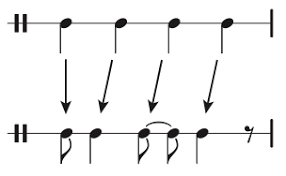I will be doing my music exam soon for school and I am very confused with this example question they gave me which was "What is the difference between playing off the beat and syncopation?". Could someone please explain this? Thank you.
-
1The question about the difference is quite interesting for an exam. I'm not sure if the answer is black or white, but the point will be that you are able to discuss about it. What have you done as research until now? You'll find plenty of articles if you google "syncopation, off-beat, difference ..."– Albrecht HügliCommented May 31, 2020 at 7:30
-
1The answers show that different people unterstand “playing off the beat” in quite widely different ways. If this exam question was graded expecting a single specific “correct” answer, then it was a bad question (though less unreasonable if the exam was following a specific course or textbook that had used one particular meaning of the phrase). On the other hand, as @AlbrechtHügli suggests, it might also have been expecting a longer answer, discussing one or more of the possible meanings of each term. The style of the rest of the exam should indicate which it was!– PLLCommented May 31, 2020 at 14:37
4 Answers
Off-beat playing is a case of syncopation, but syncopation includes more than off-beat playing.
Both terms refer to playing accented notes in places other than the strong down beats, e.g. other than beat 1 and 3 in case of 4/4 tempo.
Offbeat however mainly refers to the other down beats, the weaker beats, (e.g. beat 2 and 4 in typical 4/4 time), while syncopation could be anywhere, including on the "and" (e.g. anywhere except 1 and 3 in: 1 and 2 and 3 and 4 and)
E.g. in the first bar of "I Can't Get No Satisfaction" the accent on beat 2 is off-beat (and a syncopation), and the accent on the "and" after beat 4 is another syncopation, but not an off-beat (it's not on 4, but on the "and" after 4)
Having said that, these are not scientific terms like botanical plant names... different people use these words interchangeably and/or with their own spin and interpretation. For example, another answer suggests that off-beat means playing slightly after the precise beat, for effect, while I would call that "playing behind the beat". And, to be sure, playing behind the beat is not a case of syncopation, it is something else entirely (e.g. think of a slow blues where all the notes are played on the strong down beats -- i.e. no syncopation -- but "lazily", i.e. slightly after the beat. That's playing behind the beat, but not syncopation)
I'd say syncopation is the term super ordinate for the beat between accented beats and the and off-beat:
Syncopation implies a short note or rest "on-beat" followed by a longer accentuated note,
while off-beat can just be the notes between the the beats (e.g. "off-beat" clapping) or the rhythmically characteristic notes that are played in advance.
Denis Arnold (1979, p. 93) says: "the syncopations of this passage are of a kind which is almost a Gabrieli fingerprint, and they are typical of a general liveliness of rhythm common to Venetian music".[10] The composer Igor Stravinsky (1959, p. 91), no stranger to syncopation himself, spoke of "those marvellous rhythmic inventions" that feature in Gabrieli's music.[11]
off-beat: The beats not normally accented in a measure. The congregation clapped along on the offbeat. Wiki
For the musical term offbeat, Webster's gives, 'The part of a measure other than the principally accented one. ' That is, offbeat seems to signify, according to Webster's, the upbeat portion of a two-beat measure or the upbeat portions, taken collectively, of a measure of more than two beats.
There are different kinds of syncopation (off-beat syncopation, suspension, advanced bass)
like described here:
https://en.wikipedia.org/wiki/Syncopation
So in syncopated music the stress is on the longer note between the beats, while off-beat can be played as the rhythmical accompaniment straight between the beats - and more and less accentuated - or really as a suspended or deferred accent.
Syncopation is an emphasis on the weak part of the beat, often by playing a longer note where the weak part of the beat is.
Off the beat, means you don't play with the beat but slightly after it for effect.
I maintain that syncopation and off-beat are really distinct things, though they may sometimes come out indistinguishable.
- Syncopation is when a note/hit that conceptually belongs on a strong beat is instead moved to another time – often a quaver earlier. Sometimes that will be quite obvious (full-band chord&crash hit on time 4+, right before the start of the bar to which that chord belongs), sometimes more subtle (e.g. Tchaikovsky liked to do long syncopated violin parts in symphonies, which actually move for many bars on always the weak beats), but crucially, a syncopated note can always be associated to a particular strong beat on which it would land if it weren't syncopated.
- Off-beat is when something is put directly put on a weak beat, with no reference to one of the adjacent strong beats (or, equal relation to both neighbouring beats). The most obvious examples are the snare backbeat in a rock groove, or the skank guitar chords in Reggae. These are played and particularly felt completely separate from the strong beats; the player will often do something different on that strong beat, be it just a muted ghost-strum or a full kick drum hit. This would not be possible with a syncope, which requires space at least in that voice, so there's a clear “here's the gap where that note you just heard conceptually belongs”.
Classical musicians tend to call everything that emphasizes weak beats syncopation, but that's easily explained with the fact that there are no backbeat grooves in classical music.


